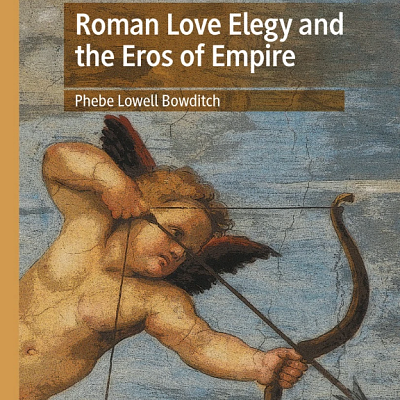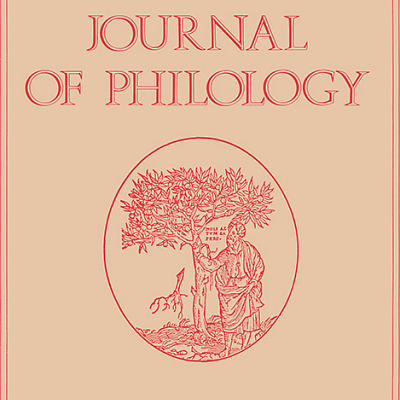Read the latest research from our department

Roman Love Elegy and the Eros of Empire
Written by Lowell Bowditch

“Why is there no Cheese in Horace’s Satires?”
Written by Mary Jaeger
Find more Faculty Publications below
Roman Love Elegy and the Eros of Empire
Lowell Bowditch, professor of Classics
This book explores Roman love elegy from postcolonial perspectives, arguing that the tropes, conventions, and discourses of the Augustan genre serve to reinforce the imperial identity of its elite, metropolitan audience. Love elegy presents the phenomena and discourses of Roman imperialism—in terms of visual spectacle (the military triumph), literary genre (epic in relation to elegy), material culture (art and luxury goods), and geographic space—as intersecting with ancient norms of gender and sexuality in a way that reinforces Rome’s dominance in the Mediterranean. The introductory chapter lays out the postcolonial frame, drawing from the work of Edward Said among other theorists, and situates love elegy in relation to Roman Hellenism and the varied Roman responses to Greece and its cultural influences. Four of the six subsequent chapters focus on the rhetorical ambivalence that characterizes love elegy’s treatment of Greek influence: the representation of the domina or mistress assimultaneously a figure for ‘captive Greece’ and a trope for Roman imperialism; the motif of the elegiac triumph, with varying figures playing the triumphator, as suggestive of Greco-Roman cultural rivalry; Rome’s competing visions of an Attic and an Asiatic Hellenism. The second and the final chapter focus on the figures of Osiris and Isis, respectively, as emblematic of Rome’s colonialist and ambivalent representation of Egypt, with the conclusion offering a deconstructive reading of elegy’s rhetoric of orientalism.
Find this book here.
Horace and the Gift Economy of Patronage
Lowell Bowditch, professor of Classics
Horace and the Gift Economy of Patronage explores select odes and epistles of the late first-century BCE poet Horace through the lens of anthropological and literary theory. Drawing on concepts of gift-exchange, this study provides a new understanding of literary patronage and Horace’s relationship with his patron, Maecenas, during the Augustan principate.
Find the book from the University of California Press.
The Porta Stabia Neighborhood at Pompeii Volume I: Structure, Stratigraphy, and Space
Kevin Dicus, assistant professor of Classics
The Porta Stabia Neighborhood at Pompeii Volume I: Structure, Stratigraphy, and Space arises from eight seasons of excavation at Pompeii (Italy). The volume encapsulates the occupational history of a sub-elite domestic neighborhood and its immediate surroundings. Its publication contributes to our understanding of the lives of non-elites in Roman cities, who comprised the great majority of the population but are little understood.
Polemical Allusion at Lucretius’ De rerum natura 1.1-9
Chris Eckerman, associate professor of Classics
In a forthcoming article to be published in Eranos, Professor Eckerman provides a new interpretation of the opening of Lucretius’ On the Nature of Things. The poem opens with a prayer to Venus. But what is Venus doing at the beginning of an Epicurean poem? Everyone knows that Epicureans did not ‘believe in’ traditional Greco-Roman gods and goddesses, like Venus, so, why would Lucretius put her there? Professor Eckerman shows that Lucretius provides cohesive sets of imagery in his Latin whereby the reader can tell that Venus serves as a metaphor for atoms—sometimes referred to as the divine for Epicureans—and shortly thereafter serves as a metaphor for Epicureanism. Thus, Venus, as a traditional Greco-Roman divinity does not inhabit the opening of the poem. Lucretius connects the procreative power of Venus in traditional Greco-Roman thought with the procreative power of atoms in Epicurean thought.
Professor Eckerman was excited to write this paper because Venus has been a ‘problem’ for readers of Lucretius’ poem for centuries. Finding that Lucretius provides the reader with enough direction to interpret Venus as Lucretius wanted the reader to interpret Venus was a gratifying experience for Professor Eckerman. Professor Eckerman hopes to share his research on Lucretius’ epicurean poem with UO students.
“Why is there no Cheese in Horace’s Satires?”
Mary Jaeger, professor of Classics
Horace’s satires include a variety of foods but make little reference to cheese and milk. This absence is understandable: they are products—and symbols—of the pastoral world. Vergil’s Georgics and Eclogues claim cheese for the country yet make it a link via commerce to the city. Varro’s De re rustica places cheese on the margins: its proper place now is away from Rome; and the right time for it at Rome was before the city’s foundation. Taken together these three texts show that the presence or absence of cheese at Rome is a matter of place and time, genre, and ideology.
This article is part of an ongoing project on food and time in Latin literature.
Read the article in the American Journal of Philology, Vol. 136.
"Les analogies entre le monde des météores et le monde des animaux"
Malcolm Wilson, professor of Classics
Aristotle believed the universe was well-ordered and intelligible to rational human beings. What made it well-ordered was the numerous analogies and correspondences among its various parts. This paper explores the surprising analogies between the world of the weather, described in Aristotle’s Meteorologica, and the world of terrestrial living things, especially animals. Strange as it may seem, the weather provides more than just the environment of terrestrial life. It is actually life-like in important ways.
Read the essay in the Analogia journal.

